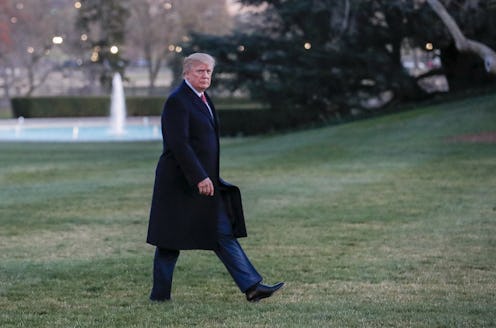
On Monday, Donald Trump signed a new travel ban executive order after his initial attempt was met with public resistance and ultimately blocked in the courts. The new travel ban will reinstate a 90-day ban on entry into the United States by citizens of six Muslim-majority countries: Iran, Libya, Somalia, Sudan, Syria, and Yemen. However, according to Reuters, Trump's new travel ban no longer includes Iraq, due to actions taken by the Iraqi government.
The original order, which was issued on Jan. 27, included Iraq as one of seven countries affected by the travel ban. The new order, however, excludes Iraq because the country's government has reportedly implemented new vetting procedures. These procedures include "heightened visa screening and data sharing," a senior White House official told Reuters.
The official also told Reuters that Iraq had been removed from the original list of countries because it has worked with the United States to counter ISIS. According to White House spokeswoman Sarah Huckabee Sanders, the new order will not go into effect until March 16, in order to prevent the "disruptions" and "havoc" that followed the immediate implementation of the last travel ban.
In addition to removing Iraq from the list of affected countries, the new travel ban order will contain other modifications. For example, green card holders from the countries named in the executive order — who were essentially left in limbo after the last ban went into effect — will reportedly not be affected this time around. Moreover, refugees who have already been approved and are "in transit" will be permitted to enter the U.S.
Another major change from the old travel ban order is that Syrian refugees will now receive the same treatment as other refugees. Rather than being banned indefinitely, Syrian refugees — as well as refugees from other countries — will all face the same 120-day suspension.
That Iraq is no longer on the list of countries targeted by the ban is significant: Many Iraqis who either fought alongside U.S. troops or served as translators have since moved to the U.S. for their own safety, and many critics as well as members of Trump's own cabinet urged the president to leave Iraq off the list.
According to The Independent, the Iraqi foreign ministry released a statement on Monday expressing relief that Iraq would no longer be affected by the travel ban. "The decision is an important step in the right direction, it consolidates the strategic alliance between Baghdad and Washington in many fields, and at their forefront war on terrorism," the statement said.
Despite these changes to the old executive order, critics have pointed out that the new travel ban still appears to contain many of the elements that led to lawsuits in the first place. First and foremost, the ban still seems to discriminate against Muslims, given that it is still targeting Muslim-majority countries.
After the last executive order was implemented, activists flooded airports across the country to protest the ban's discriminatory nature and demand that immigrants be permitted to enter the country.